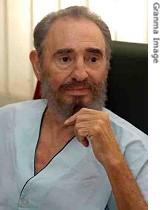-
(单词翻译:双击或拖选)
Washington, DC
01 February 2007
watch Cuba Transition Lessons
As questions continue over Cuban leader Fidel Castro's health, there is a widespread speculation1 that his communist regime will not survive without him. Many wonder whether Cuba will shed the oppressive regime and move toward a free society? If so, what challenges will it likely face? Ambassadors from four formerly2 communist East European states discussed their own countries' experiences as they transition from a one-party dictatorship to a pluralistic society. For producer Ivana Kuhar, VOA's Jim Bertel has more.
 |
| Image of Fidel Castro posted on Granma web site Tuesday, Sept. 5, 2006 |
East and Central European countries faced a similar crossroads when their own communist regimes ended in 1991. Now, 16 years later, the transition for many has been a great success:
“We have successfully turned away from a command economy to a flourishing market economy,” says Andras Simonyi, Hungarian Ambassador to the U.S. “Our societies are free. We have the freedom of speech. We have a free press. We have a rule of law and everybody is equal in front of our law. We have a multiparty political system, with checks and balances.”
Mr. Simonyi, and the ambassadors of Slovakia, Poland and the Czech Republic, participated in a roundtable discussion at the Voice of America.
Sixteen years after the demise6 of communism, these four nations are among the wealthiest post-Communist countries in Europe. The four are members of the European Union.
Slovak Ambassador Rastislav Kacer says his country's political transformation7 has not always been easy. He says it took courage to push through painful reforms. "The transformation from the centrally commanded economy to a free economy is sometimes painful. You have to restructure the economy and you necessarily have a stage when your economy is going slightly down, because you have to cut the production, which is not bringing (in) money, which was subsidized by the government. and was eating money from something else."
Privatization of state-owned business often requires foreign investments. Outside investment can lead to concerns that a country's assets are being cheaply sold to foreigners. Another common fear is that privatization brings about the disappearance8 of a comfortable social net, including universal health care and unemployment benefits.
"Not so", says the Slovak Ambassador, pointing to the profitable sale of the Slovak auto9 manufacturer Skoda to German giant Volkswagen.
"Today, it's a state-of-the-art company which is employing 10 to 20 times more people than what it used to employ in the old days. It is all Slovaks that work there. We're even coming to the limits, there are not enough Slovaks, we employ people coming from Ukraine or from Bulgaria. The average wage in the factory is, maybe, three times more than what it was before."
Peter Kolar, the Czech Republic's Ambassador to the U.S., says his countrymen are enjoying their newly acquired freedoms. "Now it is very much up to every single person to have responsibility for their own lives in their own hands. There is no central power now telling people what they have to do and how they should do that."
Simonyi says Hungarians are now true creators of their society. "If our people are not satisfied with what they see, every four years there are free elections. They vote and send a clear message how satisfied or how dissatisfied they are. That is a big deal."
The four ambassadors acknowledged that conditions in Cuba differ from that in the countries of the former Soviet10 bloc11. But they added that with Castro's demise, Cuba is poised12 for fundamental political and economic reforms. They say Cubans can draw significant lessons from the experience of Eastern Europe's transition from communism t o democracy.
 收听单词发音
收听单词发音
1
speculation

|
|
| n.思索,沉思;猜测;投机 | |
参考例句: |
|
|
|
2
formerly

|
|
| adv.从前,以前 | |
参考例句: |
|
|
|
3
defense

|
|
| n.防御,保卫;[pl.]防务工事;辩护,答辩 | |
参考例句: |
|
|
|
4
analysts

|
|
| 分析家,化验员( analyst的名词复数 ) | |
参考例句: |
|
|
|
5
Founder

|
|
| n.创始者,缔造者 | |
参考例句: |
|
|
|
6
demise

|
|
| n.死亡;v.让渡,遗赠,转让 | |
参考例句: |
|
|
|
7
transformation

|
|
| n.变化;改造;转变 | |
参考例句: |
|
|
|
8
disappearance

|
|
| n.消失,消散,失踪 | |
参考例句: |
|
|
|
9
auto

|
|
| n.(=automobile)(口语)汽车 | |
参考例句: |
|
|
|
10
Soviet

|
|
| adj.苏联的,苏维埃的;n.苏维埃 | |
参考例句: |
|
|
|
11
bloc

|
|
| n.集团;联盟 | |
参考例句: |
|
|
|
12
poised

|
|
| a.摆好姿势不动的 | |
参考例句: |
|
|
|















